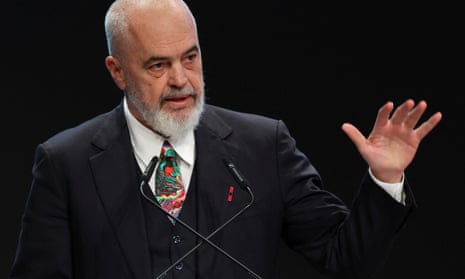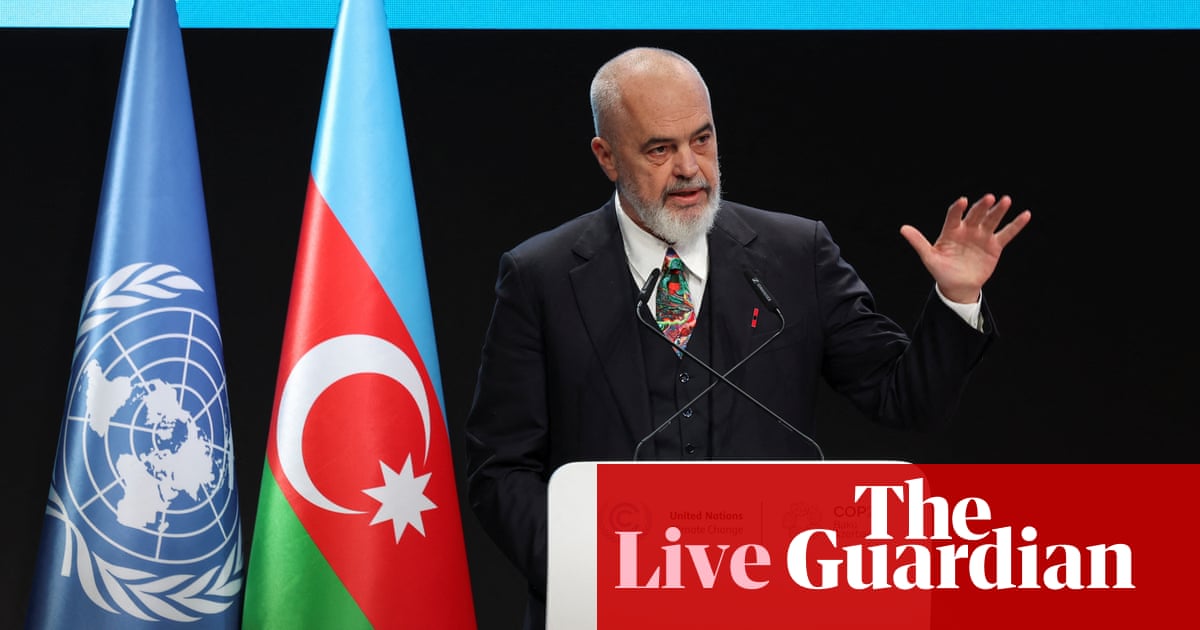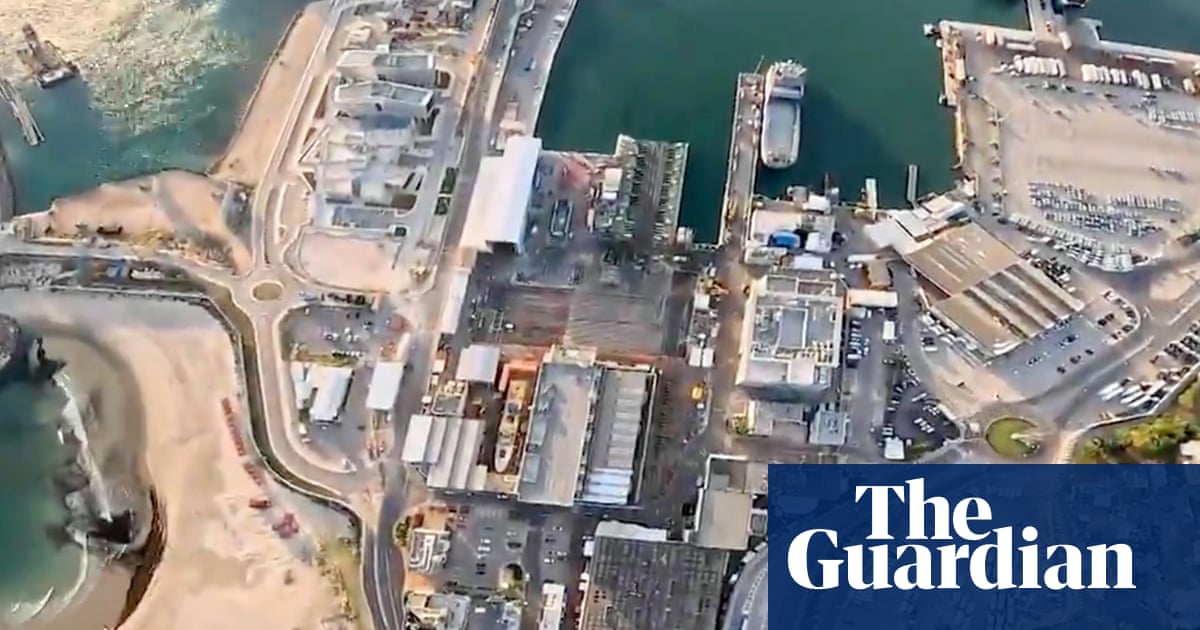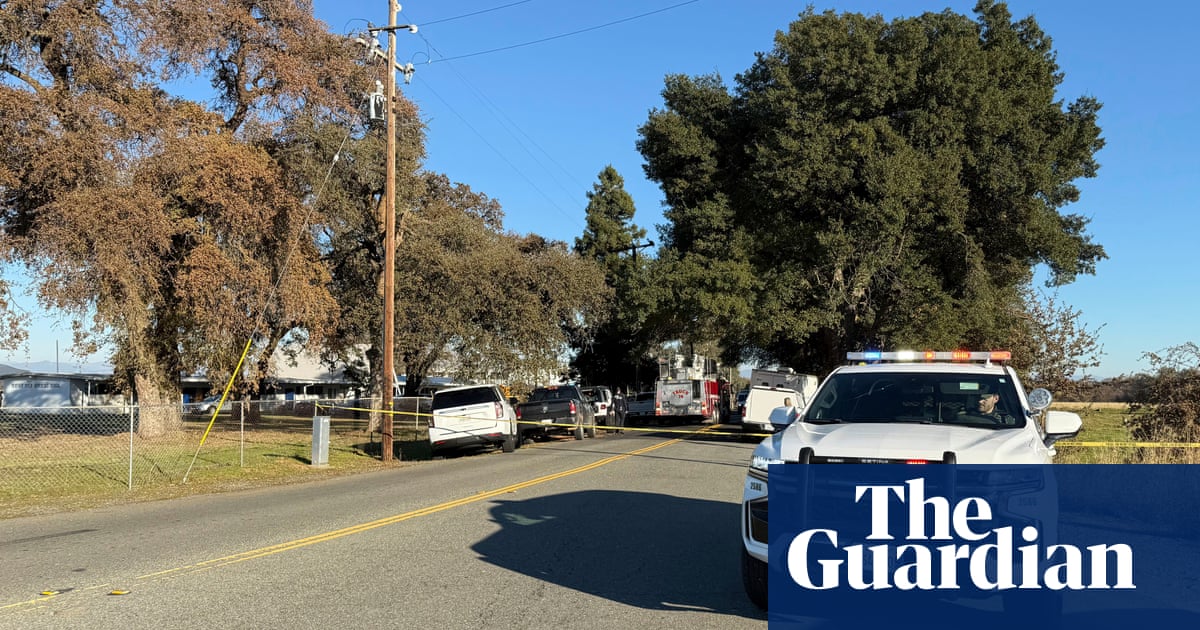Albanian PM questions point of summit ‘if biggest polluters continue as usual’

Ajit Niranjan
Edi Rama, Prime Minister of Albania, has gone off-script – he said he left behind his âwell-prepared speechâ after watching yesterdayâs leaders make their statements on silent screens above comfortable couches in an adjoining room at the Cop29 venue in Baku yesterday.
âPeople there eat, drink, meet and take photos together – while images of voiceless leaders play on and on and on in the background,â he said. âTo me, this seems exactly like what happens in the real world every day. Life goes on, with its old habits, and our speeches – full of good words about fighting climate change – change nothing.â
He pointed to the UN Secretary-Generalâs statement yesterday highlighting that carbon emissions increased between the last Cop and this one, a finding that my colleague Damian Carrington has broken down here.
âWhat does it mean for the future of the world if the biggest polluters continue as usual?â asked Rama. âWhat on earth are we doing in this gathering, over and over and over, if there is no common political will on the horizon to go beyond words and unite for meaningful action?â

Edi Rama, Prime Minister of Albania, speaks during the COP29, in Baku, Azerbaijan November 13, 2024. REUTERS/Murad Sezer Photograph: Murad Sezer/Reuters
Key events

Ajit Niranjan
Mian Muhammad Shehbaz Sharif, Prime Minister of Pakistan, has joined a chorus of leaders using their speeches to call for more money to reach their climate goals – and specifying that they need grants rather than loans that saddle them with more debt.
âWithout climate justice, there can be no real resilience,â he said. âI wouldnât want other countries to face the fight Pakistan faced in 2022.â
Pakistan was devastated by floods two years ago, shortly before Cop27. The disaster added a sense of urgency to that yearâs negotiations that helped pressure rich countries to set up a fund to pay for the losses and damages borne by poor countries. (You can read more on that from my colleague Nina Lakhani here.)
âTwo years, I warned at the top of my voice that the future would never forgive our inaction,â said Sharif. âToday, I echo the same warning with greater urgency and fullest energy at my command.â
Dharna Noor
25 countries have announced a commitment to swift and ambitious climate action.
âToo much is at stake for anything other than a race to the top,â said Hilda Heine, the president of the Republic of the Marshall Islands at a Wednesday press conference.
The statement from the âhigh ambition coalition,â formed in the lead up to the 2015 Paris Climate Accord negotiations, called for Cop29 negotiators to increase their climate finance commitments, promote accessibility to aid, and push for the transformation of international financial institutions to promote climate and development goals.
âAddressing debt and the high cost of capital is also key,â Heine said
The diverse list of signatories, including the Marshall Islands, Antigua and Barbuda, Germany, Spain, and Chile, additionally called for mitigation pledges in line with a 1.5 degree rise in temperature and increased efforts to adapt to the climate crisis. The rights of women and girls are also essential, the statement said.
On Tuesday, multilateral development banks issued a joint agreement to boost financial support for climate aid â a âcrucialâ step, said Chileâs Minister for the Environment Maisa Rojas.
âWe really needed that so that that [climate] ambition really translates into action,â she said.
In the US â which joined the high ambition coalition in 2021 â Donald Trump has pledged to pull the country from the Paris Agreement when he takes office next year. This will be a âregressive stepâ from the worldâs largest historical emitter, said Gaston Browne, prime minister of Antigua and Barbuda.
The United States has an obligation, a moral obligation, perhaps more so than any other, to provide leadership and climate funding,â he said.
But Trumpâs re-election will not derail climate progress, said Heine.
âI think already policies are already in place to move this work forward,â she said.
The by the Marshall Islands in the lead up to the 2015 Paris Climate Accord negotiations, the âhigh ambition coalitionâ aims to push the world to make swifter cuts on greenhouse gas emissions.
Albanian PM questions point of summit ‘if biggest polluters continue as usual’

Ajit Niranjan
Edi Rama, Prime Minister of Albania, has gone off-script – he said he left behind his âwell-prepared speechâ after watching yesterdayâs leaders make their statements on silent screens above comfortable couches in an adjoining room at the Cop29 venue in Baku yesterday.
âPeople there eat, drink, meet and take photos together – while images of voiceless leaders play on and on and on in the background,â he said. âTo me, this seems exactly like what happens in the real world every day. Life goes on, with its old habits, and our speeches – full of good words about fighting climate change – change nothing.â
He pointed to the UN Secretary-Generalâs statement yesterday highlighting that carbon emissions increased between the last Cop and this one, a finding that my colleague Damian Carrington has broken down here.
âWhat does it mean for the future of the world if the biggest polluters continue as usual?â asked Rama. âWhat on earth are we doing in this gathering, over and over and over, if there is no common political will on the horizon to go beyond words and unite for meaningful action?â
Edi Rama, Prime Minister of Albania, speaks during the COP29, in Baku, Azerbaijan November 13, 2024. REUTERS/Murad Sezer Photograph: Murad Sezer/Reuters

Ajit Niranjan
Muhammad Yunus, chief adviser of the interim government of Bangladesh, has hit out at âlimitless consumptionâ and called out for a new culture without waste, fossil fuels or personal profit.
âOur civilisation is at a great risk as we continue to promote self-destructive values,â said Yunus, an economist and Nobel laureate. âWe have chosen a lifestyle that works against the environment. We justify this with an economic framework that is considered as natural as the planetary system.â
Yunus became the caretaker head of Bangladeshâs interim government in August, after the nationâs longtime prime minister Sheikh Hasina fled abroad in the face of violent unrest against her rule.
Yunus called for a counter culture based on different values, but said the lifestyle would be chosen by young people, rather than imposed on them.
âIt can be done,â said Yunus. âAll we need to do is accept a new lifestyle consistent with the safety of the planet and all who live on it.â

Damian Carrington
Justice was the theme in a strong speech from Gaston Browne, Prime Minister of Antigua and Barbuda, whose islands bear the brunt of the climate-supercharged hurricanes.
âFor nations like mine, [climate change] is no longer a warning, but a daily, devastating reality. We canât wait any longer for empty pledges.â He says rich nations must deliver the trillion dollar finance deal that is the key issue at Cop29.
âTo those who bear the greatest responsibility, I say this: the time for moral responsibility is now – justice demands promises are enforced.â He calls for grants, not loans, which could worsen debt levels.
Browne also says his nation supports Vanuatuâs initiative at the International Court of Justice calling for an opinion on the legal obligations all states have in relation to climate change. âIf voluntary promises remain broken, international law will be our path to justice.â
Giorgia Meloni, Prime Minister of Italy, is now speaking at the leadersâ event, reports my colleague Damian Carrington, having âarrived late and a little out of breath.â
Meloni points out that the world population will be 8.5bn by 2030 and global GDP much higher, all bringing more demand for energy. As well as renewables, she says âgas, biofuels, hydrogen and carbon capture and storageâ all have a role, though scientists are clear all fossil fuels must be phased out.
She also cites nuclear fusion as a potential âgamechangerâ, though the joke that fusion is always 40 years away is not showing much sign of getting old. Large scale power from nuclear fusion is very unlikely to arrive in time to stop the global heating aleady wrecking communities around the world.
After a largely technical speech, Meloni finishes on a personal note: âIâm a mother, and as a mother, nothing gives me more satisfaction that when I work for policies that will enable my daughter and her generation to live in a better world.â
My colleague Damian Carrington has more from todayâs leadersâ summit at Cop29 â and news that one of the few G7 world leaders to attend has missed their speaking slot.
Italyâs prime minister, Giorgia Meloni, has missed her slot at the leaders summit part of Cop29. Meloni and the UKâs Keir Starmer are the only G7 leaders to attend.
Meanwhile, the Crown Prince of Kuwait, Sabah Khaled Al-Hamad Al-Sabah, pledges to cut his nationâs carbon emissions by 80% by 2040, which sounds very impressive but is very unlikely to include the stateâs substantial oil and gas production.
Cardinal Pietro Parolin, representing the Vatican, focuses on the trillion dollar finance for developing countries that is the key issue in Baku. He says these countries must not be put into further debt with loans for climate action: âEcological debt and environmental debt are two sides of the same coin.â
Petr Fiala, Prime Minister of Czechia basically makes a sales pitch for his nationâs nuclear power industry. âI strongly believe nuclear power is needed to meet sustainability goals.â He says Czechia has 50 years of experience and is âready to assist any countries which wishes to use it in the futureâ. Nuclear power is âclean and very safeâ, he says. Critics say it is far more expensive than renewable energy and much slower to build.

Damian Carrington
The first national leader to speak at Cop29 on Wednesday was Shina Ansari Hamedani, Vice President of Iran, and her speech was a heady mix of climate policy and geopolitics. Her key point was that the âillegal and unilateralâ international sanctions against Iran prevent it accessing the finance to build a green economy. In this she included nuclear power, the development of which is a key reason for the sanctions.
She also called the sanctions âunjustified and irrationalâ, before also condemning the war in Gaza calling Israel the âoccupying Zionist regimeâ. Her final point struck a milder note as she appealed for global action: âOur shared environment is a common bond.â
Iran is both heavily dependent on oil for revenue and very vulnerable to climate impacts, including droughts and deadly humid heatwaves.
As we are waiting for things to get going in Baku today this is a useful refresher on all things Cop from my colleague Fiona Harvey

Damian Carrington
Itâs day three of Cop29 here in Baku and more global leaders will take to the stage, including Italyâs Giorgia Meloni and Pakistanâs Shehbaz Sharif. The aim is to spur negotiators towards a strong deal by setting out the stark impacts of the climate crisis and the âterrible truthâ brought by Spainâs Pedro Sánchez and by Mohamed Muizzu from the Maldives did just that.
The president of host nation Azerbaijan Ilham Aliyev took a different tack and said his nationâs oil and gas was a âgift from Godâ.
But all countries are today facing a disastrous report card on climate action in the publication of this yearâs Global Carbon Budget report. This finds that emissions from fossil fuels, the overwhelming cause of global heating, will rise in 2024 to another record high.
That is a stark contrast to the agreement at the last summit, Cop28, to âtransition away from fossil fuelsâ, which was hailed as a landmark for the simple but astonishing reason that no previous summit agreement had mentioned fossil fuels. It is also a stark contrast to the reality that emissions must plunge by 43% by 2030 to have any chance of keeping global temperature rise below 1.5C and limiting the climate carnage.
âThe impacts of climate change are becoming increasingly dramatic, yet we still see no sign that burning of fossil fuels has peaked,â says Prof Pierre Friedlingstein, at the University of Exeter, who led the report.
So the negotiators have their work cut out to ensure that the next round of national climate commitments, due by February, deliver a step change. Tuesday did see a positive moment when the UK announced a strong commitment, pledging to cut emissions by 81% by 2035, a move that was widely welcomed in Baku.
Wednesday will also see events backed by the Cop29 presidency on advancing the effort to triple nuclear energy and address the challenges for small island developing states, who face literal extinction from the rising seas.



